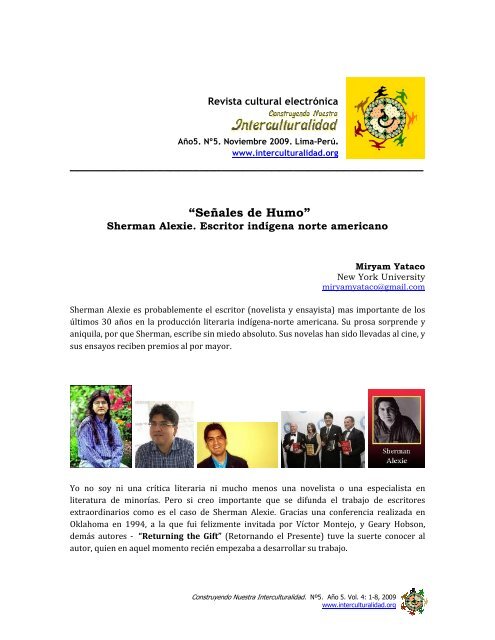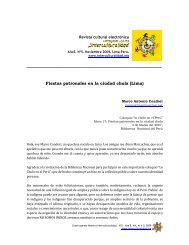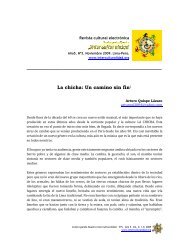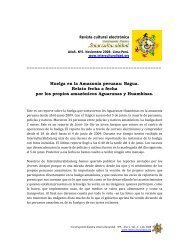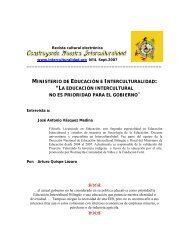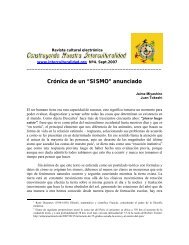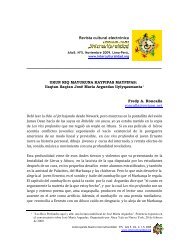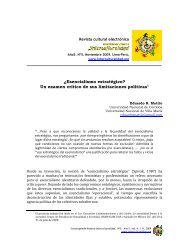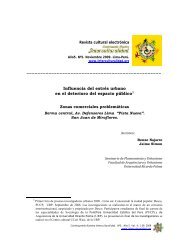“Señales de Humo” - Construyendo nuestra Interculturalidad
“Señales de Humo” - Construyendo nuestra Interculturalidad
“Señales de Humo” - Construyendo nuestra Interculturalidad
Create successful ePaper yourself
Turn your PDF publications into a flip-book with our unique Google optimized e-Paper software.
Revista cultural electrónica<br />
Año5. Nº5. Noviembre 2009. Lima-Perú.<br />
www.interculturalidad.org<br />
_________________________________________________<br />
<strong>“Señales</strong> <strong>de</strong> <strong>Humo”</strong><br />
Sherman Alexie. Escritor indígena norte americano<br />
Miryam Yataco<br />
New York University<br />
miryamyataco@gmail.com<br />
Sherman Alexie es probablemente el escritor (novelista y ensayista) mas importante <strong>de</strong> los<br />
últimos 30 años en la producción literaria indígena-norte americana. Su prosa sorpren<strong>de</strong> y<br />
aniquila, por que Sherman, escribe sin miedo absoluto. Sus novelas han sido llevadas al cine, y<br />
sus ensayos reciben premios al por mayor.<br />
Yo no soy ni una crítica literaria ni mucho menos una novelista o una especialista en<br />
literatura <strong>de</strong> minorías. Pero si creo importante que se difunda el trabajo <strong>de</strong> escritores<br />
extraordinarios como es el caso <strong>de</strong> Sherman Alexie. Gracias una conferencia realizada en<br />
Oklahoma en 1994, a la que fui felizmente invitada por Víctor Montejo, y Geary Hobson,<br />
<strong>de</strong>más autores - “Returning the Gift” (Retornando el Presente) tuve la suerte conocer al<br />
autor, quien en aquel momento recién empezaba a <strong>de</strong>sarrollar su trabajo.<br />
<strong>Construyendo</strong> Nuestra <strong>Interculturalidad</strong>. Nº5. Año 5. Vol. 4: 1-8, 2009<br />
www.interculturalidad.org
Sherman es un escritor <strong>de</strong> origen indígena norteamericano, su afiliación es Spokane/Coeur<br />
d'Alene y tiene apenas 42 años. Nació con un diagnostico <strong>de</strong> hidrocefalia cerebral y los<br />
médicos al igual que sus padres pensaron que moriría, pero se salvó. Luego que salio <strong>de</strong>l<br />
momento crítico, los médicos pronosticaron que tendría no solo serios problemas <strong>de</strong><br />
aprendizaje sino, severos problemas <strong>de</strong> retardo mental.<br />
Es obvio que se equivocaron completamente. No solo era Sherman un ávido lector, sino que<br />
tenia una memoria asombrosa y un carácter fuerte que lo hacia competitivo y audaz aunque<br />
reservado. Como el mismo expresa ‘Tuve mis ires y venires con el alcohol, como todo buen indio<br />
pero al final ahora el alcohol y yo hemos fumado la pipa <strong>de</strong> la paz. No nos agredimos, solo<br />
coqueteamos y ... <strong>de</strong> vez en cuando.’<br />
Su literatura es mordaz, con una sátira a veces casi violenta que irrumpe como un bal<strong>de</strong> <strong>de</strong><br />
agua fría sobre sus lectores. Sherman <strong>de</strong>scribe al indígena contemporáneo, al olvidado <strong>de</strong><br />
América. El cual nace y crece <strong>de</strong>ntro <strong>de</strong> las reservaciones, y se queda hasta salir corriendo<br />
hacia un mundo urbano que ni lo conoce, ni lo acepta y mucho menos lo compren<strong>de</strong>.<br />
Sherman no juega con fantasías ni estereotipos, más bien los confronta y los <strong>de</strong>shace <strong>de</strong> un<br />
zarpaso que duele dos veces. Nos duele a quienes lo leemos y a quienes se consi<strong>de</strong>ran<br />
reflejados en una realidad <strong>de</strong> la que muy pocos escriben/hablan y mucho menos lo hacen con<br />
una sinceridad tan brutal. Con Sherman, nunca verán al indio sumiso ni sosegado, al contrario<br />
el refleja a la generación <strong>de</strong> jóvenes indígenas creciendo en un ambiente fragmentado por el<br />
dolor <strong>de</strong>l pasado y la pobreza <strong>de</strong>l presente.<br />
En su libro Lone Ranger and Tonto fistfight in Heaven – el autor hace alusión a lo que significó<br />
ser un niño indígena creciendo en una reservación y mirando ‘El llanero solitario...’ a diario.<br />
Sherman nos relata su visión <strong>de</strong> las fantasías, las justificaciones sobre los personajes, sobre la<br />
imagen <strong>de</strong>l indio bueno e inteligente en esa serie.<br />
Sherman es implacable en su análisis <strong>de</strong> la violencia visual <strong>de</strong>l personaje ‘aquel que <strong>de</strong>bía<br />
representar a un indio, pero que todos sabían era un actor blanco pintado <strong>de</strong> indio.’ Sus cuentos<br />
<strong>de</strong>scriben este odio/amor <strong>de</strong> un niño que en su inocencia se i<strong>de</strong>ntificaba con los personajes<br />
<strong>de</strong> la serie. Pero con un cariño malo, un cariño que lo confundía, lo hacia quererse y odiarse al<br />
mismo tiempo. Sherman nos explica -- con una prosa implacable -- la confusión, el <strong>de</strong>seo, la<br />
búsqueda inútil <strong>de</strong> una imagen propia en la pantalla… ‘Todo ese esfuerzo perdido en la<br />
búsqueda tonta <strong>de</strong> una i<strong>de</strong>ntidad creada por Hollywood.’<br />
En sus trabajos Sherman nos <strong>de</strong>scribe a los que él llama: ‘Indios Cinemáticos’:<br />
“Cuando se trata <strong>de</strong> películas <strong>de</strong>l Oeste, los indios hemos aprendido a conformarnos<br />
con menos... algo es algo… <strong>de</strong>cía mi Tío Stubby”<br />
2<br />
<strong>Construyendo</strong> Nuestra <strong>Interculturalidad</strong>. Nº5. Año 5. Vol. 4: 1-8, 2009<br />
www.interculturalidad.org
“Mirábamos a los indios cinemáticos y nos caían bien a pesar que sabíamos que los<br />
actores no eran indios <strong>de</strong> verdad. Algunos eran guapos, y salían limpiecitos<br />
pronunciando palabras raras como ‘Kimosabe…’ A<strong>de</strong>más, esos indios no trabajaban,<br />
ni eran alcohólicos, les iba mejor que a nosotros.<br />
“Creábamos excusas para quererlos para justificar que nos representaban”<br />
“Bueno, ese Tom Laughlin no será indio <strong>de</strong> sangre, pero <strong>de</strong>bería serlo por que se ve<br />
bien y las mujeres blancas lo miran… con <strong>de</strong>seo...”<br />
“Bueno… <strong>de</strong> repente esa película no era tan interesante pero te aseguro que Sal Mineo<br />
se parece a mi tío Stubby antes que se fuera a Chicago... cuando aun vivía en la<br />
reservación…”<br />
“Bueno me han contado que Burt Reynolds tiene un poquito <strong>de</strong> Cheroqui en su<br />
familia, un poquito nomás… Sino míralo, ¿ves esos pómulos? Esos pómulos <strong>de</strong> Burt<br />
son <strong>de</strong>finitivamente indígenas...”<br />
3<br />
“Bueno... que se<br />
extinguimos...’<br />
hará… es mejor que nada… sería peor que pensaran que nos<br />
En alguna conferencia posterior, escuche a Sherman <strong>de</strong>cir: ‘Uds. tienen que tener cuidado<br />
conmigo, yo no soy un indio buenito… no he venido a contarles que practico la ceremonia <strong>de</strong> la<br />
lluvia (por que nunca la practiqué.. es mas ni siquiera la he visto .. es mas no me importa verla)<br />
… mas bien les digo que tengan cuidado conmigo yo soy un indio que creció en medio <strong>de</strong> mi<br />
pobreza viendo (en un aparato <strong>de</strong> TV medio roto, con imagen en blanco y negro y antiquísimo)<br />
The Brady Bunch, the Flintstones (Los Picapiedra) Los Patrulleros <strong>de</strong>l Oeste, Bonanza.. Mucho<br />
cuidado conmigo gente blanca <strong>de</strong> los Estados Unidos yo los conozco bien, pero uds. no me<br />
conocen a mi….’<br />
Ha escrito ‘Smoke Signals,’ (Señales <strong>de</strong> Humo) libro sobre el cual se hizo una película dirigida<br />
por Chris Eyre y a<strong>de</strong>más <strong>de</strong> gran éxito. Otros <strong>de</strong> sus libros son ’The Business of Fancy Dancing’<br />
(El negocio <strong>de</strong>l Baile Tradicional)y ‘The real story of a Part-Time Indian’ ambos han recibido<br />
premios y galardones. Pero sin duda alguna, su libro The Lone Ranger and Tonto Fistfight in<br />
Heaven (El Llanero Salitario el indio Toro) lo estableció como uno <strong>de</strong> los autores o VOCES más<br />
importantes en la escena <strong>de</strong> autores estadouni<strong>de</strong>nses.<br />
Su voz es provocadora, insistente, fuerte, tan fuerte que quema. En esta obra el autor se burla<br />
<strong>de</strong> ‘El llanero solitario…’ se burla y a la vez lo aprecia por que <strong>de</strong>spués <strong>de</strong> todo ‘el’ forma parte<br />
importante <strong>de</strong> sus memorias <strong>de</strong> niño. En sus 24 historias el autor nos presenta personajes<br />
sorpren<strong>de</strong>ntemente reales, nos <strong>de</strong>scribe con una lírica fina -- como nadie -- la realidad que<br />
significa crecer en la reservación <strong>de</strong> Spokane en la actualidad.<br />
<strong>Construyendo</strong> Nuestra <strong>Interculturalidad</strong>. Nº5. Año 5. Vol. 4: 1-8, 2009<br />
www.interculturalidad.org
Nos abre una ventana a un mundo <strong>de</strong>l cual nadie habla, <strong>de</strong>l cual nadie escribe… nos saca <strong>de</strong> la<br />
típica visión estereotipada <strong>de</strong>l indio <strong>de</strong>finido y ‘fiestado’ hasta el cansancio por la<br />
antropología física, cultural etc. Y nos lleva <strong>de</strong> un jalón en la mano y sin titubear al interior <strong>de</strong><br />
ese ser humano, el que crece en la pobreza <strong>de</strong> una reservación en don<strong>de</strong> existe el dolor, el<br />
abuso físico y emocional, el abandono, la enfermedad, el alcoholismo, en don<strong>de</strong> los jóvenes<br />
juegan a diario con la violencia. Nos enfrenta a esa ambivalencia, a ese dolor a esa vergüenza<br />
<strong>de</strong> crecer con una i<strong>de</strong>ntidad dividida, y en don<strong>de</strong> el futuro se presenta muchas veces como<br />
una lucha vencida.<br />
Sherman en todos sus libros nos habla <strong>de</strong> la soledad y <strong>de</strong> la <strong>de</strong>sesperanza con una energía y<br />
una fuerza que al leerlo uno muere y vuelve a nacer. Por eso lo recuerdo y creo que su<br />
trabajo es sin duda fantástico. Y espero que aparezcan los futuros Sherman Alexie <strong>de</strong> los<br />
grupos indígenas en el sur <strong>de</strong> América....<br />
4<br />
Official site: http://www.fallsapart.com/<br />
Algunos <strong>de</strong> los Premios y Reconocimientos Sherman Alexie:<br />
Miryam Yataco<br />
NYU<br />
• 2008 Boston Globe–Horn Book Awards for Excellence in Children’s Literature in Fiction<br />
• 2007 National Book Award for Young People's Literature<br />
• 2007 Western Literature Association Distinguished Achievement Award<br />
• 2005 Pushcart Prize for poem “Avian Nights,” published in Dangerous Astronomy<br />
• 2003 Regents' Distinguished Alumnus Award, Washington State University<br />
• 2001 PEN/Malamud Award from PEN/Faulkner Foundation<br />
• 2000 Honorary Degree from Seattle University<br />
• 1999 Honorary Degree from Columbia College, Chicago<br />
• 1999 The New Yorker: 20 Writers for the 21st Century<br />
• 1998-2001 World Heavyweight Poetry Champion<br />
• 1998 Tacoma Public Library Annual Literary Award<br />
• 1996/97 Florida International University Poetry Competition winner for "Insi<strong>de</strong> Dachau,"<br />
published in The Summer of Black Widows<br />
• 1996 Granta Magazine: Twenty Best American Novelists Un<strong>de</strong>r the Age of 40<br />
• 1995 Chad Walsh Poetry Award<br />
• 1994 Lila Wallace-Rea<strong>de</strong>rs Digest Writers' Award<br />
• 1994 Washington State University Distinguished Alumni Award<br />
• 1993 Ernest Hemingway Foundation Award Citation<br />
• 1992 National Endowment for the Arts Poetry Fellowship<br />
• 1991 Washington State Arts Commission Poetry Fellowship<br />
For The Absolutely True Diary of a Part-Time Indian:<br />
2008 Boston Globe–Horn Book Awards for Excellence in Children’s Literature in Fiction<br />
2008 Book Sense Book of the Year Children's Literature Honor Book<br />
<strong>Construyendo</strong> Nuestra <strong>Interculturalidad</strong>. Nº5. Año 5. Vol. 4: 1-8, 2009<br />
www.interculturalidad.org
5<br />
2008 Pacific Northwest Book Award<br />
2008 American Indian Library Association American Indian Youth Literature Award<br />
2007 National Book Award for Young People's Literature<br />
Publishers Weekly 2007 Best Books of the Year - Children's Fiction<br />
The New York Times Notable Children's Books of 2007<br />
Los Angeles Times Favorite Children's Books of 2007<br />
National Parenting Publication Gold Winner 2007<br />
Amazon.com Best Books of 2007<br />
Barnes & Noble 2007 Best for Teens<br />
School Library Journal Best Books of 2007<br />
Kirkus Reviews Best Young Adult Books of 2007 (pdf file)<br />
Horn Book Fanfare Best Books of 2007<br />
The Bulletin of the Center for Children's Books Blue Ribbon Winner<br />
Kansas City Star's Top 100 Books of the Year<br />
For Ten Little Indians:<br />
June 2003 Publishers Weekly editors' pick<br />
2003 USA Today summer books pick<br />
2003 Los Angeles Times Best of the Best Selection<br />
2003 San Francisco Chronicle Best Book<br />
2003 Publishers Weekly Book of the Year<br />
2003 San Jose Mercury News Best Book and Top 20 Fiction Selection<br />
2003 San Francisco Chronicle Best Seller<br />
2003 Denver Post Best Seller<br />
2003 Book Sense Best Seller<br />
2003 Los Angeles Times Book Prize in Fiction finalist<br />
2004 Washington State Book Award finalist<br />
The Best American Short Stories 2004 inclu<strong>de</strong>s “What You Pawn I Will Re<strong>de</strong>em”<br />
The O. Henry Prize Stories 2005 inclu<strong>de</strong>s “What You Pawn I Will Re<strong>de</strong>em”<br />
For The Business of Fancydancing (film):<br />
2002 Victoria In<strong>de</strong>pen<strong>de</strong>nt Film & Vi<strong>de</strong>o Festival<br />
2002 Durango Film Festival, Best Narrative Feature Film<br />
2002 San Francisco International Lesbian & Gay Film Festival, Audience Award Winner<br />
2002 Los Angeles Outfest Outstanding Screenwriting Award<br />
2002 Phila<strong>de</strong>lphia International Gay & Lesbian Film Festival, Audience Award Winner<br />
For The Toughest Indian in the World:<br />
2000 National Magazine Award nomination for "The Toughest Indian in the World"<br />
2000 Kiriyama Pacific Rim Book Prize Finalist<br />
2001 PEN USA West Fiction Award Finalist<br />
2001 PEN/Malamud Award<br />
For Smoke Signals:<br />
1998 Sundance Film Festival Audience Award<br />
1999 Christopher Award<br />
1999 Nomination for the In<strong>de</strong>pen<strong>de</strong>nt Spirit Award for Best First Screenplay<br />
1998 Florida Film Critics Circle Awards: Newcomer of the Year<br />
1998 San Diego World Film Festival: Best Screenplay<br />
For The Summer of Black Widows:<br />
The Best American Poetry 1996 inclu<strong>de</strong>s "Capital Punishment"<br />
For Indian Killer:<br />
<strong>Construyendo</strong> Nuestra <strong>Interculturalidad</strong>. Nº5. Año 5. Vol. 4: 1-8, 2009<br />
www.interculturalidad.org
6<br />
1996 The New York Times Notable Book of the Year<br />
1996 People Weekly Best of Pages<br />
For Reservation Blues:<br />
1997 Shortlist for IMPAC Dublin Literary Award<br />
1996 Before Columbus Foundation: American Book Award<br />
1996 Murray Morgan Prize<br />
For The Lone Ranger and Tonto Fistfight in Heaven:<br />
1993 PEN/Hemingway Award: Best First Book of Fiction Citation Winner<br />
1994 Lila Wallace-Rea<strong>de</strong>r's Digest Writers' Award<br />
1994 Washington State Governor's Writers Award<br />
The Best American Short Stories 1994 inclu<strong>de</strong>s "This is What It Means to Say Phoenix, Arizona"<br />
Articles en Ingles<br />
Power of Voice | NPR 2005<br />
Listen to the interview archived online.<br />
Interview with Michael Medved | Michael Medved Show, March 3, 2005<br />
Listen to the interview archived online.<br />
Studio 360 | September 18, 2004<br />
Archived online discussion of the new National Museum of the American Indian. Find other online<br />
audio archives with Sherman on this site.<br />
Sherman Alexiee, 'Sitcom American' | Morning Edition, August 18,2003<br />
Listen to an exten<strong>de</strong>d interview with Sherman on NPR.<br />
Sherman Alexie's "Ten Little Indians" | Here & Now, July 20,2003<br />
Listen to an interview archived online.<br />
Book of the Day: Ten Little Indians by Sherman Alexie | Publishers Weekly, July 7, 2003<br />
Crossing cultures Sherman Alexie explores the sacred and the profane | Book Page, June 2003<br />
American Indian filmmaker/writer talks with Robert Capriccioso | i<strong>de</strong>ntitytheory.com, March 23,2003<br />
Interview, Q&A style.<br />
Voice of the new tribes | The Guardian, Jan. 4, 2003<br />
Long profile of Sherman, dating back to his early days.<br />
Crush on Sherman Alexie | Bookslut, 2003<br />
A columnist confesses her crush on Sherman Alexie.<br />
See also, A Conversation with Sherman Alexie.<br />
POV Bor<strong>de</strong>rs | PBS.org, 2002<br />
Sherman answers six questions.<br />
Alexie sends strong signals | Milwaukee Journal-Sentinel, March 9, 2002<br />
Coverage of a speaking appearance at the University of Wisconsin-Milwaukee.<br />
An Interview with Sherman Alexie | The Iowa Review, vol. 30, no. 3, Winter 2000<br />
Juliette Torrez goes long distance with Sherman Alexie | (Sic) Vice & Verse, Aug. 31, 1999<br />
<strong>Construyendo</strong> Nuestra <strong>Interculturalidad</strong>. Nº5. Año 5. Vol. 4: 1-8, 2009<br />
www.interculturalidad.org
7<br />
Interview with Juliette Torrez.<br />
The NewsHour With Jim Lehrer | The NewsHour With Jim Lehrer, July 9, 1998<br />
Transcript of "A Dialogue on Race with Presi<strong>de</strong>nt Clinton" with Jim Lehrer, Richard Rodriguez,<br />
Cynthia Tucker, Kay James, Sherman Alexie, Elaine Chao, Roger Rosenblatt, Roberto Suro and<br />
Clarence Page.<br />
Without reservations | Salon.com, July 2, 1998<br />
Q&A focusing on Smoke Signals.<br />
Sending Cinematic Smoke Signals - An Interview with Sherman Alexie | Cineaste v23, n4, Fall,<br />
1998<br />
Q&A focusing on Smoke Signals<br />
An Indian without reservations | New York Times Magazine, Jan. 18, 1998<br />
note: There is a fee to view archived articles.<br />
© 2008 FallsApart Productions.<br />
NOTE: Stu<strong>de</strong>nts wanting to properly cite this page in their papers can credit this text to FallsApart<br />
Productions.<br />
Lo pue<strong>de</strong>n ver a Sherman en:<br />
http://www.youtube.com/watch?v=e-4jSTNsuLQ&feature=related<br />
Image from<br />
Oregon State University<br />
<strong>Construyendo</strong> Nuestra <strong>Interculturalidad</strong>. Nº5. Año 5. Vol. 4: 1-8, 2009<br />
www.interculturalidad.org
8<br />
Photo Rob Casey<br />
Cómo citar este artículo:<br />
Yataco, Miryam. <strong>“Señales</strong> <strong>de</strong> <strong>Humo”</strong>. Sherman Alexie. Escritor indígena norte americano.<br />
Revista Electrónica <strong>Construyendo</strong> Nuestra <strong>Interculturalidad</strong>, Año 5, Nº5, Vol. 4: 1-8, 2009.<br />
Disponible en: http://www.interculturalidad.org/numero05/docs/0212-<br />
Sherman_Alexie_Escritor_indigena_norte_americano-Yataco,Miryam.pdf.<br />
<strong>Construyendo</strong> Nuestra <strong>Interculturalidad</strong>. Nº5. Año 5. Vol. 4: 1-8, 2009<br />
www.interculturalidad.org


